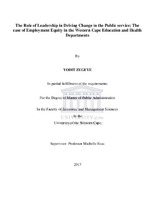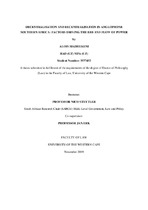| dc.description.abstract | Road rage, aggressive driving and other hazardous driving appear to be of increasing concern in South Africa as evidenced by its increasing publicity in the media and discussion in society. Considering the high international prevalence and our staggering road traffic injury statistics, it was pertinent to study to determine the nature and extent of these behaviours. Furthermore, profiles of victims and perpetrators of these and 'other high-risk driving behaviours' were generated by studying associated predictor variables. A total of 1006 participants were included in the study. The target population was urban motorists in Durban and the sample was acquired from randomly selected petrol stations in the Durban Metropolitan Area. The study was a cross-sectional descriptive survey and an interviewer-administered semistructured
questionnaire was used for this purpose. Driver aggression was categorised into four sub-scales: 1) mild, verbal but non-threatening expression of annoyance, 2) verbal or other expression of anger directed at the offending motorist, 3) threatening or intimidating behaviour, 4) experience of rage and 'loss of control', direct confrontation and pre-meditated behaviour. Sub-scales 1-2 provided a measure of aggressive driving behaviour while sub-scales 3-4 provided a measure of road rage. A modified semantic differential on a scale of 1-10 was used to measure aggressive driving and 'other high-risk driving behaviours'. Many predictor variables were identified for driver aggression and 'other high-risk driving behaviours' based on demographics (gender, age, education and race), with general driving characteristics ( driving experience and type of vehicle driven) and with fines, collisions and the carrying of weapons. Based on these results, the broader relevance of the study as well as implications for intervention are discussed under the 4 universal public health strategies for intervention - Education, Enforcement, Environmental modification and Engineering. | en_US |




